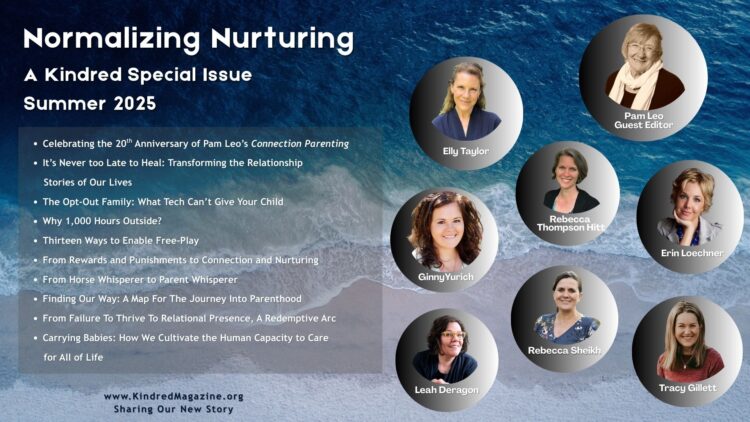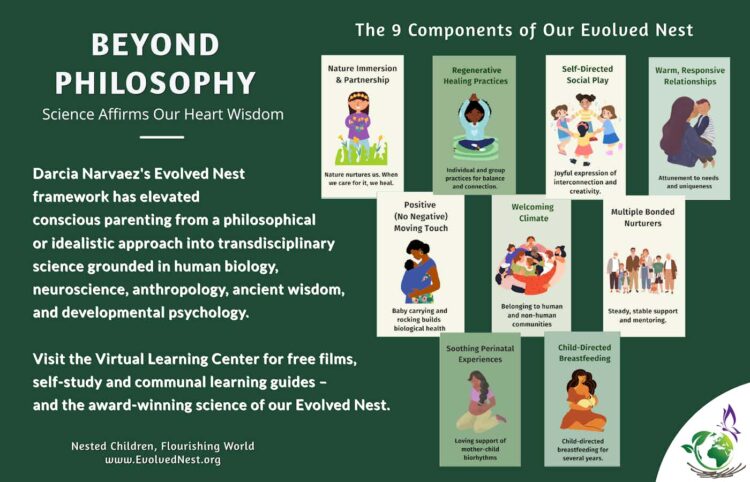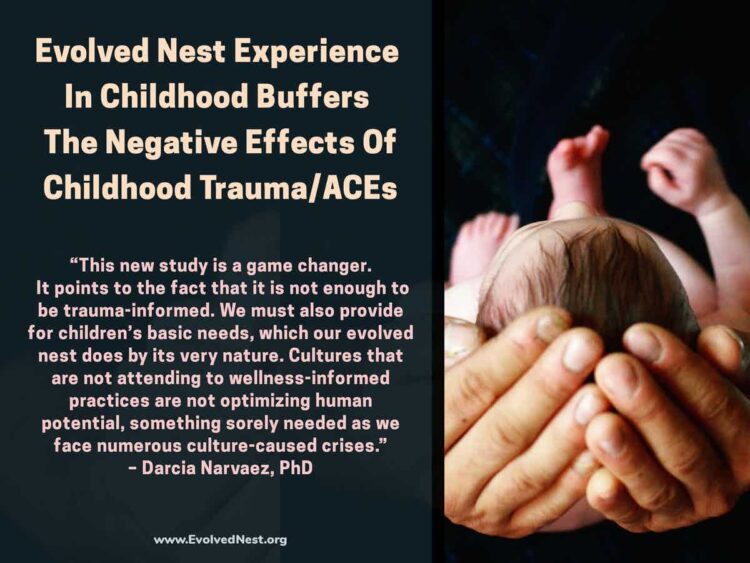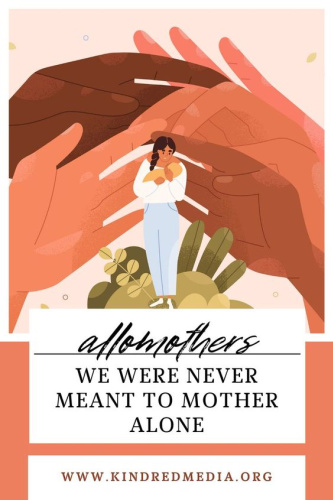
The Buffering of Belonging: The Facilitation to Flocks’ Sequence
Birth Roots’ Facilitation to Flocks redemptive arc restores what clinical models leave out: relational scaffolding, peer attunement, and cohort co-regulation as practices that ripple outward into families, systems, and culture. It is both a return to something ancestral and a path forward to something urgently needed: a culture where survival is not the ceiling, but the floor and where the buffering of belonging is embedded in the early parenthood experience as a cultural practice, not left to chance as a personal goal or individual achievement.
Two decades ago, two doulas in Portland, Maine noted that brand new parents felt very, very alone. They noticed and named that for the majority of U.S. parents, regardless of demographics or economics, the enormous transition into new parenthood occurred without adequate systems of care in place, without structural or systemic investment, and without the range of resources needed for optimal parent and child development.

As the 20th century became the 21st, one thing was painfully obvious to these doulas: more often than not, new parenthood left new parents feeling deeply flawed. The very premise and context of early parenthood required unsuspecting new recruits to have superhuman amounts of resilience. And when they inevitably could not keep up, they felt inadequate and unqualified, isolated and ashamed. So in 2003, these two doulas began poking holes in this context and premise – asking questions like, “Couldn’t the benefits of doula support scale from – one family at a time – to the collective or community level? Couldn’t cohorts of parents benefit from the doula model of non-clinical support that was improving perinatal outcomes?”
To test our theory, we designed and delivered a far more relationship-centered or relational approach to perinatal education. This initiative was a departure from contemporary childbirth preparation or postnatal integration; an altogether different model that emphasized community building and prioritized skill building over book learning or lectures. People need information, yes, but they need well-facilitated settings that expand mindsets and skill sets, even more. They need settings that are designed for trust to take root, that reliably invite authentic relationships to take form and take hold.
In an effort to address isolation in early parenthood we founded a nonprofit organization called Birth Roots – a Center for Community Supported Parenting. As an organization, Birth Roots’ mission is to create a culture of community support for early parenthood. Beyond the bare minimum of what new parents need, Birth Roots identifies, recognizes, and tends to the non-clinical needs of new parents, by offering prenatal and postnatal classes, groups and events that cultivate meaningful, durable and enduring peer support. When parents have opportunities to focus on improving communication and relationship skills, these connections and networks become a protective factor, bolstering families when they face challenges both large and small, extending far beyond time spent in classes.
Birth Roots is, a place where new parents can find each other while adapting to a profoundly new role, and, a space where they can synthesize conflicting information as they make parenting decisions specific to the differentiated needs of their distinct family. Communicating about child bearing and rearing is a life skill that must be acquired and developed over time. Where there is scaffolding for this growth, new parents become increasingly more equipped to self-advocate and more confident in their ability to communicate effectively about topics as complex as parenting, parenthood and child development. Birth Roots provides this scaffolding. Community Supported Parenting has become synonymous with the praxis of self reflection and group reflection, both before and after a baby’s arrival.
The work of updating how we think about and talk about caregiving, how we value and invest in new parents, and commit to a more honest narrative about the enormous effort of early parenthood, is culture changing work. Over and over again we must acknowledge the vulnerability of newborns and their care. We must agree as a premise that we do not leave newborns, or new parents, to fend for themselves. Community Supported Parenting is the necessary work of Birth Roots – precisely because it is not yet the cultural norm.
From Facilitation to Flocks

For much of modern history, psychological and medical frameworks assumed that if a baby was fed, clothed, and housed, they would develop normally. Emotional needs were seen as secondary, intangible, optional, even indulgent. Within hospitals, orphanages, and early childcare systems, caregiving prioritized hygiene and nutrition over presence and attunement. Crying infants were ignored to prevent “spoiling.” Children were managed, not mirrored.
But by the mid-20th century, a new lens was emerging: babies who were housed and fed but emotionally invisible, such as those in Romania’s state-run orphanages, failed to thrive. Many became withdrawn, developmentally delayed, or stunted, despite receiving what was, by old standards, “adequate care.” What was missing was relational presence, a caregiver who saw them, responded to them, and helped them feel safe in their body and in the world. This realization marked a historic turning point. Through attachment theory (Bowlby), infant mental health (Brazelton), and later, trauma-informed science (ACEs, BEIP), the field began to recognize that connection is not a luxury, it is biological infrastructure. Since the turn of the century, this understanding has expanded into classrooms, clinics, and social media. Yet methods for reliably restoring relational health in our hyper-individualized society are still catching up. Birth Roots was founded in this gap.
In this gap, Birth Roots has pioneered a redemptive model, a strategy that balances introspection, group reflection and community sourcing. It’s not therapy nor is it self-help. It’s a third space that is simultaneously non-clinical and trauma-informed. We describe this redemptive arc as, Facilitation to Flocks.
A Flock is not a friend group or a social club. It’s a relational container formed through a very intentional facilitation style, where cohorts of families learn and internalize the core skills of relational presence. The role of the facilitator is temporary by design. Birth Roots facilitators model relational presence, cohorts learn to sustain it collectively. From there, a Flock becomes a unit of decentralized leadership that is both reflective and collective. It is a redefinition of community-based perinatal care as a collaborative practice that strengthens with repetition.
Flocks are cohorts of local parenting-phase peers, typically 7 families, often 14 parents. They provide weekly, if not daily, validation, perspective and witnessing – in other words – tracking over time. Following a Birth Roots class, a Flock stays connected and current with each other, most commonly through a group text thread where they help each other, seek ideas, opinions, solutions and share stories or insights. Over months and often years, a Flock builds shared history and memory of the arc of family development by planning get-togethers, swapping childcare, sharing photos, high & lows, and benefitting from the reassurance of 6 other families as a source of stability and visibility. Some Flocks function at the level of reducing the isolation of the first year of parenting through playdates, resource sharing and comic relief, while others become like family.
As a non-clinical intervention, the Facilitation to Flocks model affirms and applies the updated understanding that relational presence is a primary need, not only for infants, but for those who care for them. Healthy human development, for parents, children, and communities emerges not from the accumulation of tips or techniques, but from sustained experiences of being seen, held, and witnessed within a co-regulating cohort.
Why Flocks Work – the Buffering of Belonging
 Long standing social norms and narratives focus solely on the effort of isolated, individual households rather than on coordinated, collective, or cultural strategies for ensuring childhood health and wellbeing. When the extraordinary labor of early parenthood remains undervalued and overextended, new parents are left vulnerable to a narrative of self-blame, personal failure, and individual inadequacy. The impact of Birth Roots’ fieldwork has been as much about changing this narrative as providing local, non-clinical care and community-based support to more than 7,000 families since 2004.
Long standing social norms and narratives focus solely on the effort of isolated, individual households rather than on coordinated, collective, or cultural strategies for ensuring childhood health and wellbeing. When the extraordinary labor of early parenthood remains undervalued and overextended, new parents are left vulnerable to a narrative of self-blame, personal failure, and individual inadequacy. The impact of Birth Roots’ fieldwork has been as much about changing this narrative as providing local, non-clinical care and community-based support to more than 7,000 families since 2004.
It is important to note and name that women, mothers, birthing people, and primary caregivers are encouraged to double down on self-improvement whenever they come up short. We are told our healing is ours alone – our symptoms and our suffering are for managing in privacy and isolation. However, research on groups focused on healing found that moving away from a focus on a singular self is the most potent healer. Simply by shifting our grammar from I to we, from my to our.
It is not enough to offer “parenting tips” or individual therapy sessions. What is needed is a “right-sized paradigm of collective care”, grounded in the understanding that mental health is relational, generational, and systemic. Current clinical models and practices are built on the flawed premise that healing can occur in isolation. But mental health is relational health, which is not the same as simply being around other people. It requires an infusion of attunement, a felt sense of the social buffering necessary to ensure that the transition into parenthood doesn’t come at the cost of the health and well-being of new parents.
Decades of research, from Bowlby’s attachment theory to the Romanian orphanage studies (BEIP), the ACE Study, and traumal-informed neuroscience demonstrate that a child’s ability to regulate, trust, and belong is biologically shaped by consistent, attuned, responsive relationships during sensitive periods of early development. Relational-Cultural Theory and contemporary polyvagal-informed models build on this by showing that – attunement and attachment are not only essential for children, but must also be extended to caregivers and communities, affirming that relational health is sustained collectively, not individually.
 Just as science revealed the catastrophic effects of emotional neglect on infants, even when food and shelter were provided, we are now beginning to reckon with a broader truth: caregivers, too, cannot function in isolation. We cannot expect parents and caregivers to offer emotional availability and relational presence to children while they themselves operate in a vacuum of practical support or social buffering.
Just as science revealed the catastrophic effects of emotional neglect on infants, even when food and shelter were provided, we are now beginning to reckon with a broader truth: caregivers, too, cannot function in isolation. We cannot expect parents and caregivers to offer emotional availability and relational presence to children while they themselves operate in a vacuum of practical support or social buffering.
The nervous system of the caregiver is the climate and landscape of the developing child. When that nervous system is stretched thin by chronic stress or intergenerational trauma, even the most devoted caregivers may struggle to stay attuned. Many modern families, but particularly those navigating poverty, marginalization, disability, or untreated trauma find themselves in conditions that are functionally parallel to institutional care: unpredictable caregiving, overstimulation, and emotional invisibility.
Children may live under the same roof as their parents, yet still experience the kind of relational deprivation that undermines attachment and attunement. In these environments, caregivers are cast as individual agents responsible for producing optimal developmental outcomes while the collective scaffolding that makes such outcomes possible is withheld. Just as we once believed a fed baby would thrive, we now falsely believe a well-intentioned parent can buffer a child from the effects of systemic instability on their own. The next necessary leap in our psychological and public health understanding is this: Relational health is ecological. It requires not just one-on-one attachment between parent and child, but nested layers of support around the caregiver. Emotional and sensory attunement in early life is not simply a product of parental effort, it is a cultural endeavor.
This is the gap that Birth Roots targets. The Facilitation to Flocks model recognizes that while most parents are expected to “find their village,” few are given the tools to build one. A Center for Community Supported Parenting like Birth Roots, provides structured settings where caregivers can receive the very thing they are trying to provide: attachment and attunement, in the form of witnessing and social buffering over time. This is not a luxury. It is the premise for responsive caregiving. Relational presence is not sustained by individual resilience. It is sustained by relational infrastructures, and relational facilitation is the first step toward establishing these.
Birth Roots’ Facilitation to Flocks redemptive arc restores what clinical models leave out: relational scaffolding, peer attunement, and cohort co-regulation as practices that ripple outward into families, systems, and culture. It is both a return to something ancestral and a path forward to something urgently needed: a culture where survival is not the ceiling, but the floor and where the buffering of belonging is embedded in the early parenthood experience as a cultural practice, not left to chance as a personal goal or individual achievement.
For more information about Birth Roots, Community Supported Parenting, or the Facilitation to Flocks model: visit www.birthroots.org www.facilitatingcommunity.org or contact leah@birthroots.org

